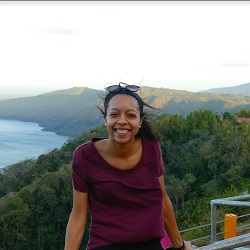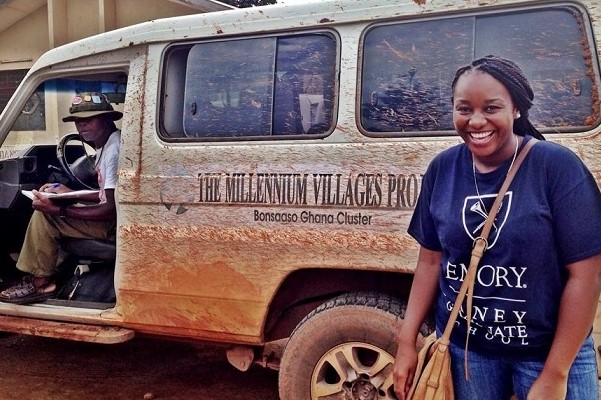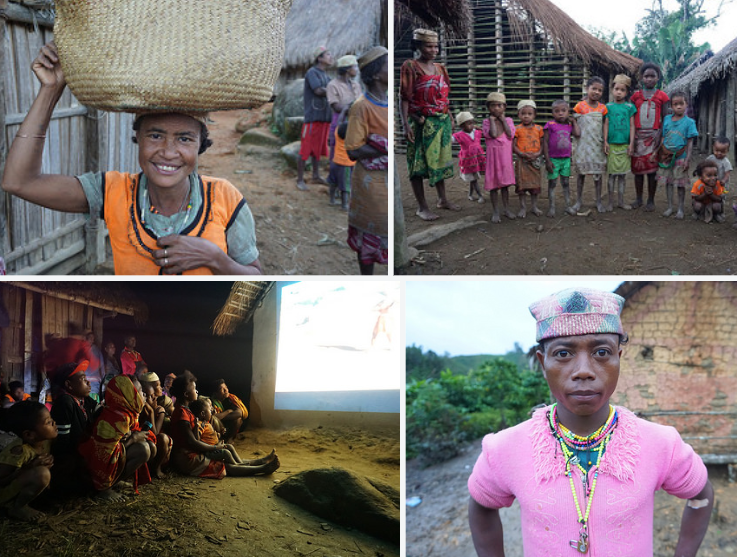Student Spotlight: Alyssa Bovell

From her research in Chile to an internship at CARE USA, MDP student Alyssa Bovell has proven to be a fierce advocate for gender justice. Her reflective nature allows her to bring critical analysis to any scenario that tips the scales of power to create space for everyone.
Q:What made you decide to pursue a Master’s in Development Practice?
A: I received my undergraduate degree from the University of Dayton and come from an academic and professional background in international studies, human rights & development. Through these experiences, I’ve developed a commitment to a profession that focuses on accompanying and supporting individuals to transform their communities based on a shared vision. I was specifically drawn to MDP because of the opportunity to pursue a multidisciplinary international development degree that was focused on critically examining the development and humanitarian spaces.
Q: How do you envision applying this program to your future career?
A: MDP provided me with an opportunity to focus in the area of gender justice & women’s rights across the development and humanitarian spheres. I’m very interested in learning and understanding the ways in which power is manifested that influences inclusion & exclusion, how individuals adapt to their local realities, and how this impacts gendered relations at the various levels of society. I’m also interested in the ways in which these understandings cut across diverse identities and influence interests and interpretations of empowerment.
Q: What accomplishments during this program are you most proud of?
A: Through MDP, I’ve had the opportunity to work with the Gender Justice team at CARE USA, which supports the design, adaptation, and amplification of gender-transformative approaches across CARE’s programming. Collaborating with and learning from this team has been challenging, thought-provoking, and inspiring and I’m very grateful for the opportunity to work with this team. Also, learning Portuguese.
Q: How do you engage in development outside of the classroom?
A: Mostly through my work with the Gender Justice team at CARE USA, but I’ve also been volunteering with Do Good Health, an initiative with Land of a Thousand Hills Coffee Company. I’m supporting the team in building a curriculum to train community health volunteers and ambassadors for the community’s health center. I’ve also continued to work on a research project from my 2018 summer practicum. Last summer I was in Santiago, Chile with the Emory Global Health Institute (EGHI), that conducted a qualitative assessment to explore the perceptions and experiences regarding the care of birth and delivery processes of pregnant immigrant populations assisted in Santiago. We aimed to understand the ways in which women understood their SRMH experiences in the hospital from pre-natal to post-partum care and how the practice of midwifery addresses quality health care for vulnerable groups, to achieve equitable care within its various health programs.
Q: What was/is one of your frustrations with the field of development?
A: A lot of my time outside of the classroom is spent learning about the ways that injustices such as patriarchy, racism, and white supremacy are challenged (or not) within development. I’m frustrated at the ways that these subjects aren’t discussed in development and humanitarian spaces or solely framed through a lens of diversity and inclusion. I think it’s convenient to think that as development, humanitarian, or public health professionals, we’re all free from these systems of privilege and power disparities when in fact we’re perpetuating them in both explicit and nuanced ways. We have a responsibility to develop a critical consciousness around all areas of injustice and to actively address this within our work.
Q: What was your favorite class? Why?
A: Gender and Global Health from Emory’s Rollins School of Public Health and taught by Dr. Kathryn Yount. This course was a combination of learning about theory and hearing about research and interventions related to gender and health, which provided a critical discussion around the areas of gender inequalities and power dynamics that influence gender politics and relations at the various levels of society. The course had me consider the various determinants and underpinnings of power in decision making that impact the health of all genders.
Q: If you weren’t in development, what you would be doing?
A: I’m a huge coffee fan and have dreamed of being a barista and learning how to make the world’s best mocha.
Q: How has your perspective on development changed?
A: I’m not sure that my perspective has changed necessarily, but I will say that MDP has provided me with the academic stimulation to develop a critical consciousness around areas of injustice and the ways in which I can assess the social, economic, and political contexts that will inform steps taken to support the dignity of individuals in various contexts. I do believe that addressing multi-faceted challenges requires a multidisciplinary approach and that addressing root causes of injustice will support social transformation.
Q: What is a skill you gained?
A: A skill that I specifically learned through MDP is monitoring & evaluation that I’ve become increasingly interested in developing as a skill set. I’m interested in the ways in which lessons are learned in interventions, success and failure are framed, and the ways in which these findings are used. I hope to further develop this skill set as it’s become essential as development grapples with failure and how to learn from it.
Curriculum
The Emory MDP curriculum combines natural, social, health sciences and management.
FIELD PRACTICUM
The Field Practicum is a core component of the Emory MDP curriculum.
Check out this post on InstagramA post shared by Emory MDP (@emorymdp) on


